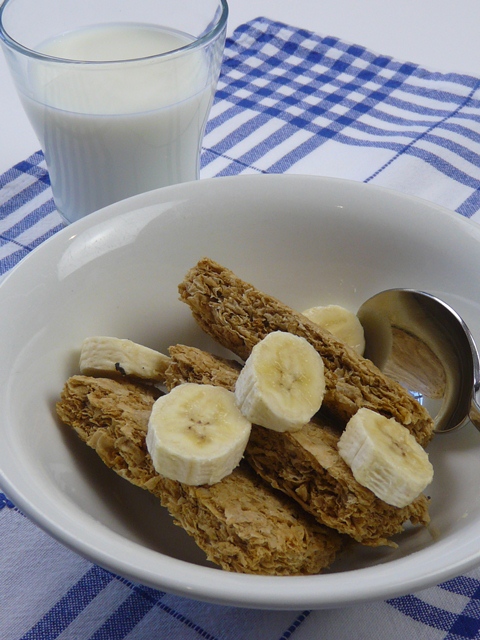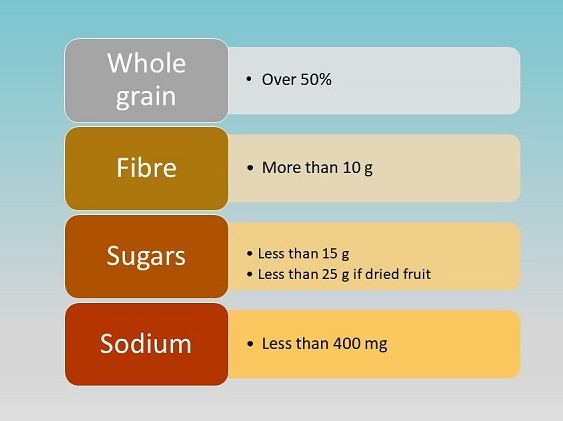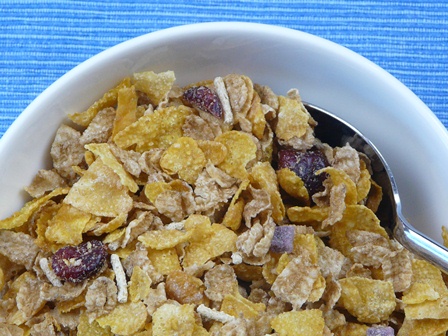How to buy a healthy breakfast cereal

How many times have you heard this: “It’s better to eat the box than the cereal”? That’s fine if you’re after fibre in the form of cellulose (and I get the cereal joke), but it doesn’t address the needs of busy women who are after something quick in the morning rush, that makes a decent contribution to nutrition, and solves the problem of how to get the kids to eat something rather than nothing before school. Oh and one that tastes good too!
Many kiddie cereals aren’t ideal in terms of fibre and whole grain content but they are inexpensive, high in starchy carbohydrate that fills up tummies, low in fat, fortified with four B vitamins and iron. Cereals are generally eaten with milk which contributes protein and bone-building calcium AND lowers the glycemic load of the meal.
But after that, cereals differ greatly – some are high in fibre, some are wholegrain, two things which are big on my list. Some are fortified with extra calcium, vitamin C, vitamin A or zinc (you can check the label), some are less processed, some have lots of sugar, others have next to none.
My 4 steps to choosing a healthy cereal
Puffed, rolled, flaked or popped, there are oodles of breakfast cereals. What I want is one with the most fibre and/or wholegrains but the lowest sugars and sodium (salt). One that will fill me up and take me to lunch! Sounds easy but isn’t always.
Me? I’m a muesli Queen at breakfast. I love my muesli as I’ve said before. But at times I want variety and when the kids were little, we had up to FIVE packs of bought cereal in the kitchen. So I’ve been down the cereal aisle more than once. Here’s what I look for.
1. Look for fibre

For instance, a bowl of bran cereal (like the ever-popular All-Bran) gives you 9 grams of fibre, which is around one-third of your recommended daily intake. Read the back of the box and look for 10 per cent or more (run your eye down the Per 100 gram column). 10 per cent is equivalent to 3 grams of fibre per 30 g bowl.
Bran cereals (All-Bran, Sultana Bran) have between 15 to 30 per cent while Corn Flakes and Rice Bubbles are down at a low 2 per cent.
Alternatively you can sprinkle a couple of spoons of All-Bran Fibre Toppers or Guardian or psyllium flakes over your usual cereal. To max your fibre, I’ve listed my top ten nicest-tasting cereals for fibre to show you the range at the high end.
| Cereal |
% fibre
|
g fibre per serve |
Serve size * |
|
Uncle Toby’s Bran Plus |
40 |
18.0 |
45 g |
|
Kellogg’s All-Bran Original |
30 | 13.3 | 45 g |
|
Goodness Superfoods Digestive 1st |
25 | 12.7 | 50 g |
|
Vogel’s Ultra Bran and Soy |
26 | 11.5 | 45 g |
|
Kellogg’s Guardian |
22 | 6.5 | 30 g |
|
Sanitarium Weet-Bix Hi-Bran |
18 | 7.3 | 40 g, 2 |
|
Kellogg’s Sultana Bran |
15 | 6.7 | 30 g |
|
Uncle Toby’s Shredded Wheat |
13 | 6.2 | 47 g, 2 |
|
Sanitarium Weet-bix |
12 | 3.3 | 30 g, 2 |
|
Uncle Toby’s Vita Brits |
12 | 4.2 | 33 g, 2 |
Recommended daily intake |
- |
25-30 |
- |
* serve sizes as specified by the manufacturer on pack
2. Look for Wholegrain
Look for a cereal that contains 50 per cent whole grains or more. It’s usually splashed all over the front. The more, the better. Weet-Bix has 97 per cent whole grains while rolled oats hits the max at 100 per cent.
If not, you can check the list of ingredients for clues that “Whole Grains” are present. Words like whole wheat, whole barley, oat AND brown rice are clues. My tip: go for a cereal that contains the words ‘whole ’ or ‘ wholegrain ’ in the first two ingredients.
3. Be moderate with sugars
I don’t want a sugary cereal but I don’t mind a little sweetness. So I follow a general rule summarised from many criteria over the years eg Choice, Heart Foundation Tick, which says to choose a cereal with:
15 per cent sugars or less
OR
25 per cent sugars or less
if the cereal has dried fruit such as sultanas, raisins, dried apple or dried apricots (e.g. Sultana Bran, Just Right, Fibre Plus, muesli) as these contribute their own sweetness.
The content of sugars varies from a tiny one per cent for oats, Vita Brits or Weeties to almost a hefty 40 per cent in Frosties, Froot Loops or Crunchy Nut Corn Flakes. Added sugar in cereals is such a festering sore that I plan to write a separate post on it.
Note: "sugars" includes both added AND natural. The food label isn't helpful here!
4. Go easy on sodium (salt)
Ideally you want as little sodium as possible. Technically a low-salt cereal must have less than 120 mg per 100 g but companies today have been gradually reducing their salt content which is a great improvement on years past. Compare brands and buy the lowest sodium content you can. Anything under 400 mg per 100 g is good.
Summary - Cereal label decoder - My 4 things to look for in the "Per 100 grams" column and on pack:

Tip - watch the serve size
A standard serve of cereal used to be 30 grams which means one cup of bubbles or flakes or two breakfast biscuits. But these days the serve sizes vary so much as some manufacturers have decided a serve is now 45 g (a huge 50% increase!) in their bid to claim the “highest fibre content” or the “most vitamins”. Not a helpful move when nutritionists are warning you to watch your portion sizes. You may eat more or less than this. Muesli is heavy and can range from 45 g to 60 g. I’ve compared the figures on an equal basis of 100 grams as the serve sizes differ so much.
Sugars, fibre, fat and salt in that cereal
Ranked by increasing sugars content with cut off for 15, 20 and 25 per cent shown.
|
Cereal |
Sugars % |
Fibre % |
Fat % |
Sodium mg per 100 g |
|
Oats, raw |
0 |
10 |
9 |
7 |
|
Vita-Brits |
<1 |
12 |
2 |
400 |
|
Weeties |
1 |
12 |
2 |
400 |
|
Shredded Wheat |
2 |
13 |
1 |
10 |
|
Weet-bix |
3 |
11 |
1 |
290 |
|
Corn Flakes |
8 |
3 |
0 |
550 |
|
Rice Bubbles |
9 |
1 |
0 |
550 |
|
Mini Wheats, Mixed berry |
11 |
10 |
1 |
10 |
|
Guardian |
12 |
22 |
1 |
215 |
|
All-Bran |
14 |
30 |
3 |
380 |
|
Uncle Toby’s Bran Plus |
14 |
40 |
5 |
390 |
|
Vogel’s Ultra Bran |
14 |
26 |
2 |
320 |
|
Special K |
15 |
3 |
0 |
490 |
|
Cheerios |
16 |
10 |
3 |
295 |
|
Muesli^ |
18 |
11 |
7 |
28 |
|
Sustain |
20 |
6 |
3 |
97 |
|
BarleyMax Digestive |
21 |
25 |
6 |
56 |
|
Sultana Bran |
23 |
15 |
2 |
270 |
|
Just Right |
29 |
8 |
2 |
30 |
|
Crunchy Nut Flakes |
32 |
3 |
3 |
355 |
|
Nutri-grain |
32 |
3 |
1 |
560 |
|
Coco Pops |
37 |
1 |
0 |
465 |
|
Froot Loops |
38 |
2 |
2 |
400 |
|
Frosties |
41 |
2 |
0 |
350 |
All figures rounded to the nearest whole number. Source: Manufacturers’ data / Calorie King Australia online. ^Manufacturer’s data: Uncle Toby’s Swiss-style Natural.
My top 10 healthiest breakfast cereals
All these 10 cereals meet my four criteria and are tasty and readily available at supermarkets. Yes there are other brands and new ones that come onto the shelves all the time so this list is not exhaustive. I’ve not included mueslis as they are a separate group but for me I’d have one in there as well.
- Sanitarium Weet-Bix/ Uncle Toby’s Vita-Brits
- Traditional oats (Uncle Toby’s, Brookfarm, Lowan, Carmen’s)
- Kellogg’s All Bran
- Kellogg’s Sultana Bran
- Kellogg’s Bran toppers/Flakes – good for boosting the fibre of low fibre cereals
- Kellogg’s Mini Wheats, Plain or Apricot or Blackcurrant
- Kellogg’s Guardian – good for boosting the fibre of low fibre cereals
- Uncle Toby’s Shredded Wheat
- Kellogg’s Sustain Goodness
- BarleyMax Digestive 1st
The bottom line
Any plain cereal based on oats or wheat biscuits is great for a healthy breakfast. Keep the sugar or honey you add yourself to a bare minimum. Just enough to sweeten. Add in a sliced banana or a handful of sultanas or some stewed or fresh fruit as well.








